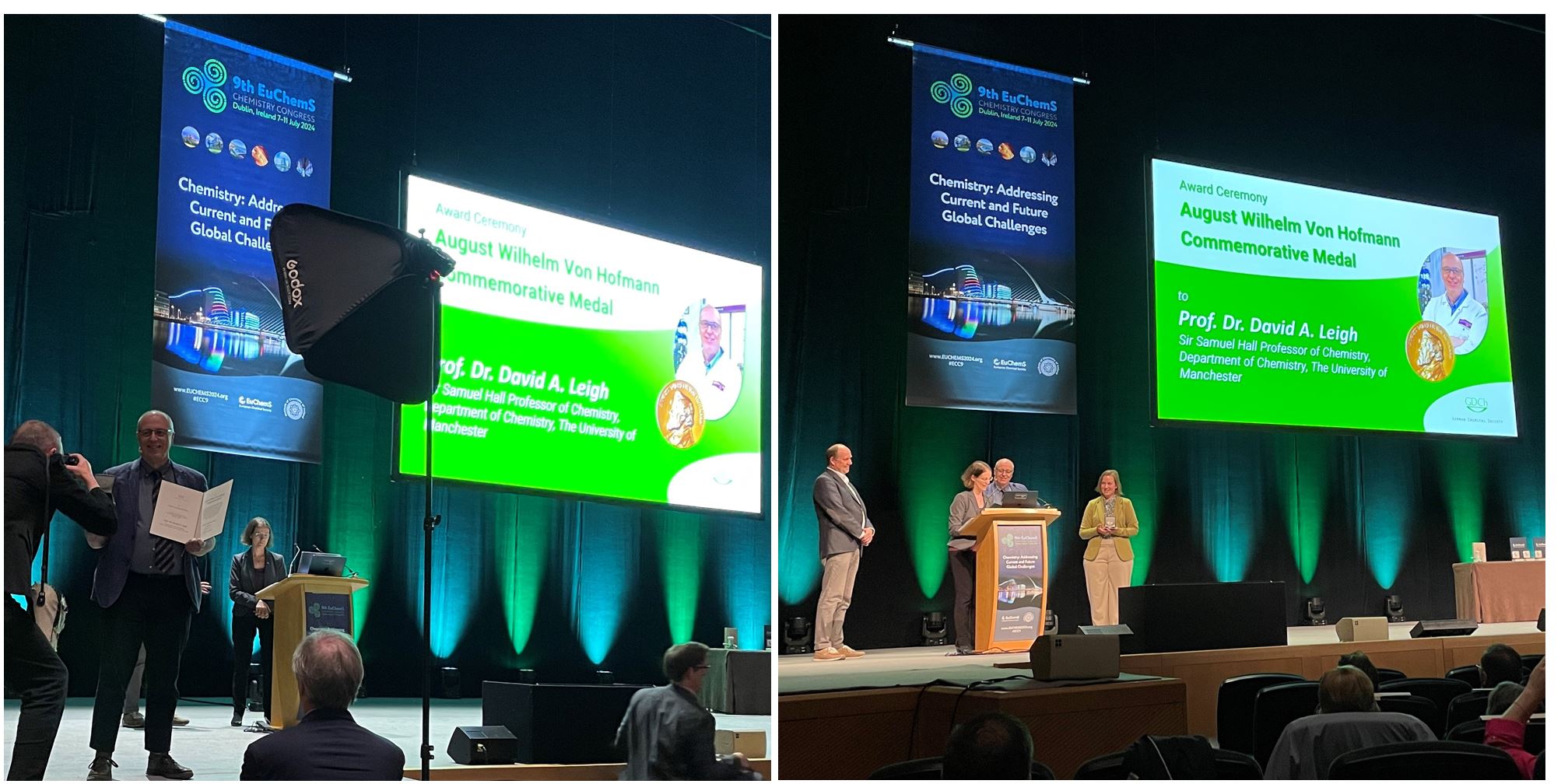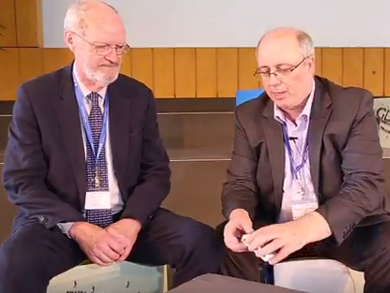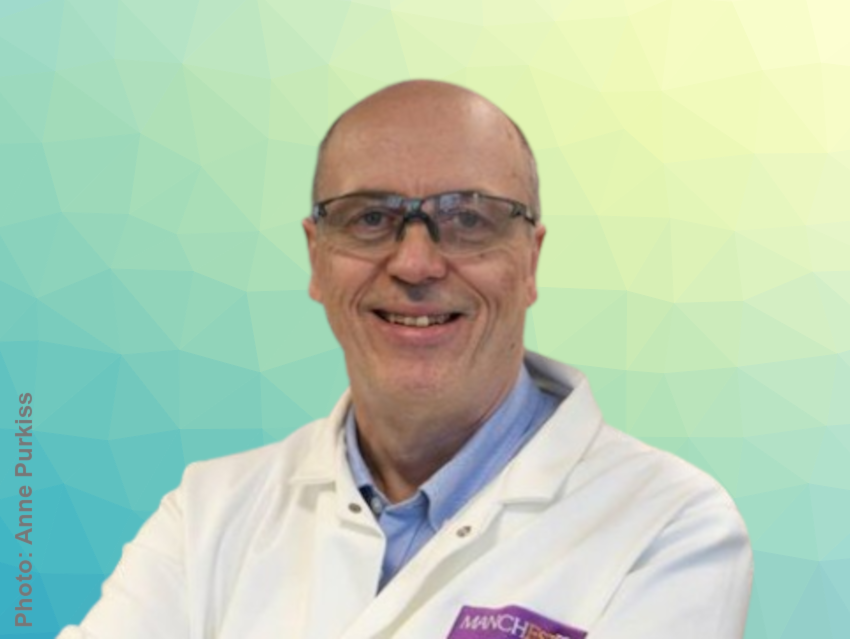David A. Leigh, University of Manchester, UK, has received the August Wilhelm von Hofmann Medal 2024 from the German Chemical Society (GDCh). The award was presented at the 9th EuChemS Chemistry Congress in Dublin, Ireland, on July 11, 2024. The GDCh awards the August Wilhelm von Hofmann Medal for special merits in chemistry to foreign chemists or to German nationals who are not chemists but who have achieved great things in chemistry.
David A. Leigh is honored for his pioneering achievements in the field of nanoscience as well as his tireless efforts as an ambassador for chemistry. Leigh’s research deals with artificial molecular machines and molecular topology and has had a major impact on supramolecular chemistry. He has developed innovative concepts for the synthesis of interlocking molecular architectures, pioneered the control of molecular motion, and synthesized very complex artificial molecular structures.
Leigh has developed, for example, molecular catenane motors, artificial machines that can transport droplets along inclined surfaces, a molecular machine that uses thermal energy to move molecules in a specific direction, and artificial molecules that can “walk”. He has also worked on highly complex molecular knots and the synthesis of astonishingly simple chemically driven rotors.
In addition to his outstanding research work, David Leigh has worked tirelessly as an ambassador for chemistry, inspiring a wide audience and promoting interest in the subject. In public lectures, Leigh combines magic tricks with scientific content and impresses both expert and non-expert audiences. He has also employed unusual ways of science communication. For example, his working group commissioned a popular music video about nanorobotics. He is actively committed to supporting chemistry education for girls and financially disadvantaged students.
David A. Leigh was born in Birmingham, UK, in 1963. He studied chemistry at the University of Sheffield, UK, where he received his Ph.D. in 1987 under the supervision of Fraser Stoddart. After research stays at the National Research Council of Canada, Ottawa, and at the University of Manchester Institute of Science and Technology, UK, he was appointed Chair of Synthetic Chemistry at the University of Warwick, UK, in 1998. In 2001, Leigh was appointed Forbes Chair of Organic Chemistry at the University of Edinburgh, UK. He has served as a Professor of Organic Chemistry at the University of Manchester, UK, since 2012, and has also been a Royal Society Research Professor since 2016.
In addition to numerous other awards, David Leigh has received three ERC Advanced Grants (2008, 2013, 2018), the Feynman Prize for Nanotechnology from the Foresight Institute and the Descartes Prize for Research from the European Union in 2007, the Royal Society of Chemistry (RSC) Tilden Prize in 2010, the RSC Pedler Award in 2014, the Perkin Prize for Organic Chemistry from the RSC in 2017, the ISNSCE (International Society for Nanoscale Science, Computation and Engineering) Nanoscience Prize in 2019, and the Royal Medal from the Royal Society of Edinburgh in 2021.
He is a Clarivate Analytics Web of Science Highly-Cited Researcher, a Member of the Academia Europaea, an Honorary Member of the Israel Chemical Society, and a Fellow of the Royal Society (London) and the American Academy of Arts and Sciences.
 Snapshots from the award ceremony.
Snapshots from the award ceremony.
Selected Publications
- Molecular Ratchets and Kinetic Asymmetry: Giving Chemistry Direction,
Stefan Borsley, David A. Leigh, Benjamin M. W. Roberts,
Angew. Chem. Int. Ed. 2024.
https://doi.org/10.1002/anie.202400495 - Mechanical scission of a knotted polymer,
Min Zhang, Robert Nixon, Fredrik Schaufelberger, Lucian Pirvu, Guillaume De Bo, David A. Leigh,
Nat. Chem. 2024.
https://doi.org/10.1038/s41557-024-01510-3 - Changing Liquid Crystal Helical Pitch with a Reversible Rotaxane Switch,
Sujun Chen, Nathalie Katsonis, David A. Leigh, Manee Patanapongpibul, Alexander Ryabchun, Liang Zhang,
Angew. Chem. Int. Ed. 2024.
https://doi.org/10.1002/anie.202401291 - Artificial molecular motors,
Salma Kassem, Thomas van Leeuwen, Anouk S. Lubbe, Miriam R. Wilson, Ben L. Feringa, David A. Leigh,
Chem. Soc. Rev. 2017, 46, 2592–2621.
https://doi.org/10.1039/c7cs00245a - Artificial Molecular Machines,
Sundus Erbas-Cakmak, David A. Leigh, Charlie T. McTernan, Alina L. Nussbaumer,
Chem. Rev. 2015, 115, 10081–10206.
https://doi.org/10.1021/acs.chemrev.5b00146 - Sequence-Specific Peptide Synthesis by an Artificial Small-Molecule Machine,
Bartosz Lewandowski, Guillaume De Bo, John W. Ward, Marcus Papmeyer, Sonja Kuschel, María J. Aldegunde, Philipp M. E. Gramlich, Dominik Heckmann, Stephen M. Goldup, Daniel M. D’Souza, Antony E. Fernandes, David A. Leigh,
Science 2013, 339, 189–193.
https://doi.org/10.1126/science.1229753 - Synthetic Molecular Motors and Mechanical Machines,
Euan R. Kay, David A. Leigh, Francesco Zerbetto,
Angew. Chem. Int. Ed. 2006, 46, 72–191.
https://doi.org/10.1002/anie.200504313
Also of Interest

Video: David Leigh does some magic with Nobel Laureate Robert H. Grubbs

![Synthesis of [c2]Daisy Chains via Mechanochemistry](https://www.chemistryviews.org/wp-content/uploads/2025/04/202504_RotaxanesWithSolidStateMechanochemistry-125x94.png)


